

Predatory Journals Are Also Shameless. Why is it called the 'theory of evolution' but the 'law of gravity'? - Quora. How to bring better ethics to data science. iStock In the waning months of the Bloomberg administration, I worked for a time in a New York City Hall data group within the Health and Human Services division.
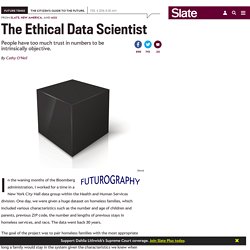
One day, we were given a huge dataset on homeless families, which included various characteristics such as the number and age of children and parents, previous ZIP code, the number and lengths of previous stays in homeless services, and race. The 7 biggest problems facing science, according to 270 scientists. Science is in big trouble.
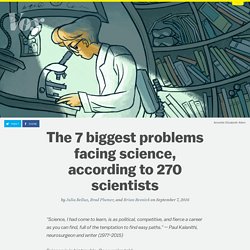
Or so we’re told. Scientists aren’t gods. They deserve the same scrutiny as anyone else. I am not obese or dying of cancer.

Nor am I a hypochondriac. But not a day passes without my absorbing news of imminent salvation or disaster from some branch of science. And whereas the panjandrums of big science used to maintain an aura of lofty objectivity as they demand our attention and cash, they now seem all over the shop, fighting like rats in a sack. Take obesity. I am reeling from last month’s BBC knuckle fight between the dietician Aseem Malhotra and the government obesity tsar, Susan Jebb, over whether fat makes you fat. When I see a doctor, I hope to receive the benefit of a scientific mind, trained to assess evidence and draw therapeutic conclusions. Two years ago, the government’s chief medical officer, Sally Davies, was so worried that she stated, with the authority of her office, that “the threat to humanity from drug-resistant infection is worse than that of climate change”.
You might think you know, but do you really? Important scientific words expla... A fan theory about how R+L=J is also a theory, but that's not what scientists mean when they use that word.
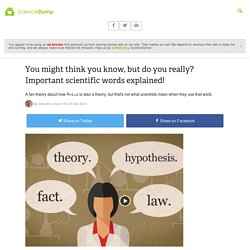
I don't know about you, but I'm getting kind of sick of people misunderstanding the words theory and hypothesis and turning them into something bad. Whenever I hear someone say that evolution is only a theory, I am immediately reminded of Wallace Shawn's character Vizzini from The Princess Bride going around yelling "inconceivable! " at every turn, and in really having no clue what it actually means. Twentieth Century Fox In the above great video by It's Okay To Be Smart words such as theory, hypothesis, fact and law are explained in the way that scientists use them, not the way we use them in everyday speech.
Is Breakfast Really the Most Important Meal of the Day? Breakfast has been made out to be one of the most important meals of the day.

It’s considered taboo to skip it, and we'll even go so far as to shame people for doing so. After all, making time to eat this one meal allows our lives to improve dramatically, or so it seems. Without it we've been told we run the risk of having lower IQs or increasing our risk of coronary heart disease. However, breakfast's magical properties may have been overstated. Aaron E. One study actually looked at the common proposition that skipping breakfast causes weight gain. Cereal companies have a vested interest to make sure consumers buy into breakfast. Last Week Tonight with John Oliver: Scientific Studies (HBO) Theory vs. Hypothesis vs. Law… Explained! Gravitational Waves Detected, Confirming Einstein’s Theory. How the Microscope Redefined the Fact.
A picture may be worth a thousand words, but the inverse is also true: A word is worth a thousand pictures.
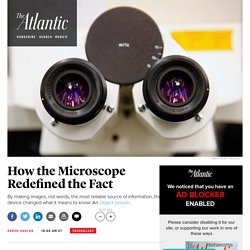
If I say “bear,” you might picture a grizzly or a black bear, a polar bear, a panda bear, a burden of weight or stress (“more than I can bear”), or even a cartoon or plush toy (like the Care Bears). This slippery, imprecise quality of words was a serious concern for scientists in the mid-17th century.
The Day After Tomorrow: A Scientific Critique. The 2004 film The Day After Tomorrow, in which global warming leads to a new ice age, has been vigorously criticized by climate scientists.
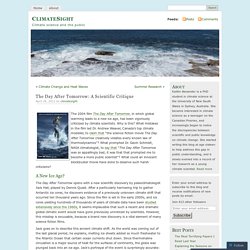
Why is this? What mistakes in the film led Dr. Andrew Weaver, Canada’s top climate modeller, to claim that “the science-fiction movie The Day After Tomorrow creatively violates every known law of thermodynamics”? What prompted Dr. Gavin Schmidt, NASA climatologist, to say that “The Day After Tomorrow was so appallingly bad, it was that that prompted me to become a more public scientist”? History of the Scientific Method - How Science Became Important. The history of the scientific method is a fascinating and long one, covering thousands of years of history.
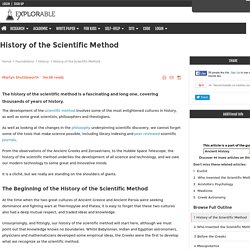
This article is a part of the guide: Discover 44 more articles on this topic Browse Full Outline. Humanist vs Islamic perspectives on science and the modern world. Two important figures came head-to-head at Conway Hall, to discuss Islamic versus Humanist perspectives on science and the modern world.
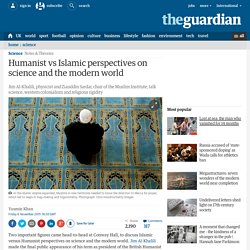
Jim Al-Khalili made the final public appearance of his term as president of the British Humanist Association during this stimulating, and at times provoking, debate with Ziauddin Sardar, chair of the Muslim Institute. Al-Khalili advocated the values of the European Enlightenment, arguing that ever since the “Age of Reason” took hold during the 18th century, Humanists have looked to science instead of religion to explore and comprehend the world. Sardar upheld the view that it is the combination of faith and reason that offers a fuller understanding of the world, maintaining that it was this worldview that enabled the development of science in the Islamic golden Age.
A practising Muslim, Sardar is on an independent mission to promote rational, considered thought in interpreting the Qur’an. And what if science proves religious dogma to be incorrect? Debate over chimpanzee 'accent' study. Image copyright Jamie Norris / University of York A debate is unfolding among primatologists about a study, published in February, which reported that chimpanzees can adapt their grunts to communicate with new neighbours.
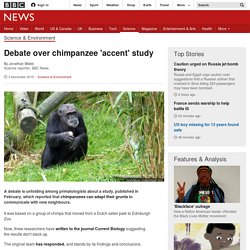
It was based on a group of chimps that moved from a Dutch safari park to Edinburgh Zoo. Top 5 misconceptions about evolution. CERN has detected extremely rare particle decay for the first time. Researchers working at CERN in Switzerland have detected a never-before-seen subatomic process that was "harder to find than the famous Higgs particle", and it could make or break our understanding of the Universe. By combining the results of two separate experiments at the Large Hadron Collider (LHC), the researchers were able to detect the extremely rare decay of a particle called the strange B (Bs) meson into two muons, something that the Standard Model of particle physics predicts will only occur about four times out of a billion - which is pretty much what the experiments found.
"It's amazing that this theoretical prediction is so accurate and even more amazing that we can actually observe it at all," one of the team, Sheldon Stone from Syracuse University in the US, said in a press release. "This is a great triumph for the LHC and both experiments. " "It’s not way off the Standard Model prediction, but it’s low enough to keep us questioning,” said Butler. Never-ending universe. Steven WeinbergTO EXPLAIN THE WORLD The discovery of modern science416pp.
Allen Lane. £20.978 0 241 19662 5US: Harper. $28.99. 978 0 06 234665 0 Published: 6 May 2015 Galileo demonstrating the law of gravity, 1839, by Giuseppe Bezzuoli Photograph: © Leemage/UIG via Getty Images We hope you enjoy this free piece from the TLS, which is available every Thursday in print and via the TLS app. This week’s issue also features Eugene O’Neill in life and on stage; Transnistria, the country that exists for its people but for no one else; the aftermath of Gaddafi’s downfall; the commodification of nature – and much more. Richard Feynman - Ode To A Flower. The science behind the Palaeo diet.
Why doctors and scientists are so anxious about the rise of pop science. To hear Oliver Sacks tell it, writing books for a mass audience was once considered one of the worst things a doctor could do. In his new memoir On the Move, Sacks recalls the day his first book was published in 1970. Born in 1933 to two prominent doctors, Sacks happened to be staying in his family's London home at the time. Oliver Sacks's new memoir, On The Move. (Knopf via Amazon.com) "My father came into my bedroom, pale and shaking," Sacks writes, "holding the Times in his hands. Nowadays, of course, that's changed. Scientists Alter DNA in Human Embryos. Defending Darwin. I’M OFTEN ASKED what I do for a living. My answer, that I am a professor at the University of Kentucky, inevitably prompts a second question: “What do you teach?”
Responding to such a question should be easy and invite polite conversation, but I usually brace for a negative reaction. At least half the time the person flinches with disapproval when I answer “evolution,” and often the conversation simply terminates once the “e-word” has been spoken. Occasionally, someone will retort: “But there is no evidence for evolution.” Or insist: “It’s just a theory, so why teach it?” At this point I should walk away, but the educator in me can’t.
The magic of consciousness. Top 5 misconceptions about evolution. Homeopathy not effective for treating any condition, Australian report finds. Homeopathy is not effective for treating any health condition, Australia’s top body for medical research has concluded, after undertaking an extensive review of existing studies. Homeopaths believe that illness-causing substances can, in minute doses, treat people who are unwell.
The Science of Why We Don't Believe Science. How our brains fool us on climate, creationism, and the vaccine-autism link. Illustration: Jonathon Rosen.
What would Wittgenstein say about that dress? Radio 3 Essay by BBC- Nature of Science. Relativity Isn't Relative. Should Pluto regain planet status? A Harvard science historian thinks so. Poor pluto! Peter Higgs: I wouldn't be productive enough for today's academic system. Peter Higgs, the British physicist who gave his name to the Higgs boson, believes no university would employ him in today's academic system because he would not be considered "productive" enough. The emeritus professor at Edinburgh University, who says he has never sent an email, browsed the internet or even made a mobile phone call, published fewer than 10 papers after his groundbreaking work, which identified the mechanism by which subatomic material acquires mass, was published in 1964.
Fluid Experiments Support Deterministic “Pilot-Wave” Quantum Theory. For nearly a century, “reality” has been a murky concept. 10 Scientific Ideas That Scientists Wish You Would Stop Misusing. The Moons of Jupiter — The Message. Michael Shermer: Why people believe weird things. Long-Term Science: When Research Outlives The Researcher. Hide captionWilliam Beal, standing at center, started a long-term study on seed germination in 1879. He buried 20 bottles with seeds in them for later researchers to unearth and plant. Michigan State University William Beal, standing at center, started a long-term study on seed germination in 1879. He buried 20 bottles with seeds in them for later researchers to unearth and plant.
Paradigm shift. Science and media. Scientific theories that took absurdly long to be proven. Uncertainty reigns over Heisenberg's measurement analogy. A row has broken out among physicists over an analogy used by Werner Heisenberg in 1927 to make sense of his famous uncertainty principle. This Idea Must Die: Some of the World’s Greatest Thinkers Each Select a Major... By Maria Popova. Ethical Decision Making. Myth: "Eventually, science will explain everything." “Eventually Science Will Explain Everything” The Island of Knowledge: How to Live with Mystery in a Culture Obsessed with Certainty and Definitive Answers. Neil deGrasse Tyson: The Next Great Scientific Breakthroughs.
NASA Just Released The Largest Picture Ever Taken And It Will Shake Up Your U... The Cathedral of Computation. Carl Sagan’s Message to Mars Explorers, with a Gentle Warning. The real science of science fiction. Michio Kaku: Is God a Mathematician? The Scientific Method. Sir Karl Popper's "Science as Falsification" Why We Don’t Believe In Science. What Should Teachers Say to Religious Students Who Doubt Evolution? 10 Greatest Ideas in the History of Science.
Einstein and 'Where Science and Religion Coexist' What is school science for? Who is it for? Where Is the Proof in Pseudoscience? Evolution-creation debate unlikely to change minds. Five science ‘facts’ we learnt at school that are plain wrong. God, Darwin and My College Biology Class. A Theoretical Physicist Explains Why Science Is Not About Certainty.
Great moments in Science (if Twitter had existed) 10 Scientific Ideas That Scientists Wish You Would Stop Misusing. Whole Foods: America’s Temple of Pseudoscience. Not all scientific studies are created equal - David H. Schwartz. The Science of “Intuition” Why Pluto is No Longer a Planet. 6 Angry Letters Kids Sent Neil deGrasse Tyson About Pluto. The Baloney Detection Kit: A 10-Point Checklist for Science Literacy. BBC’s Volatile History of Chemistry. Thomas Kuhn: the man who changed the way the world looked at science. What Is Science? From Feynman to Sagan to Asimov to Curie, an Omnibus of Definitions. Open Questions in Physics. Top 10 Unsolved Mysteries of Science. The 20 big questions in science. Bioinformatician at large: My Emotions in Science. What Is Pseudoscience?